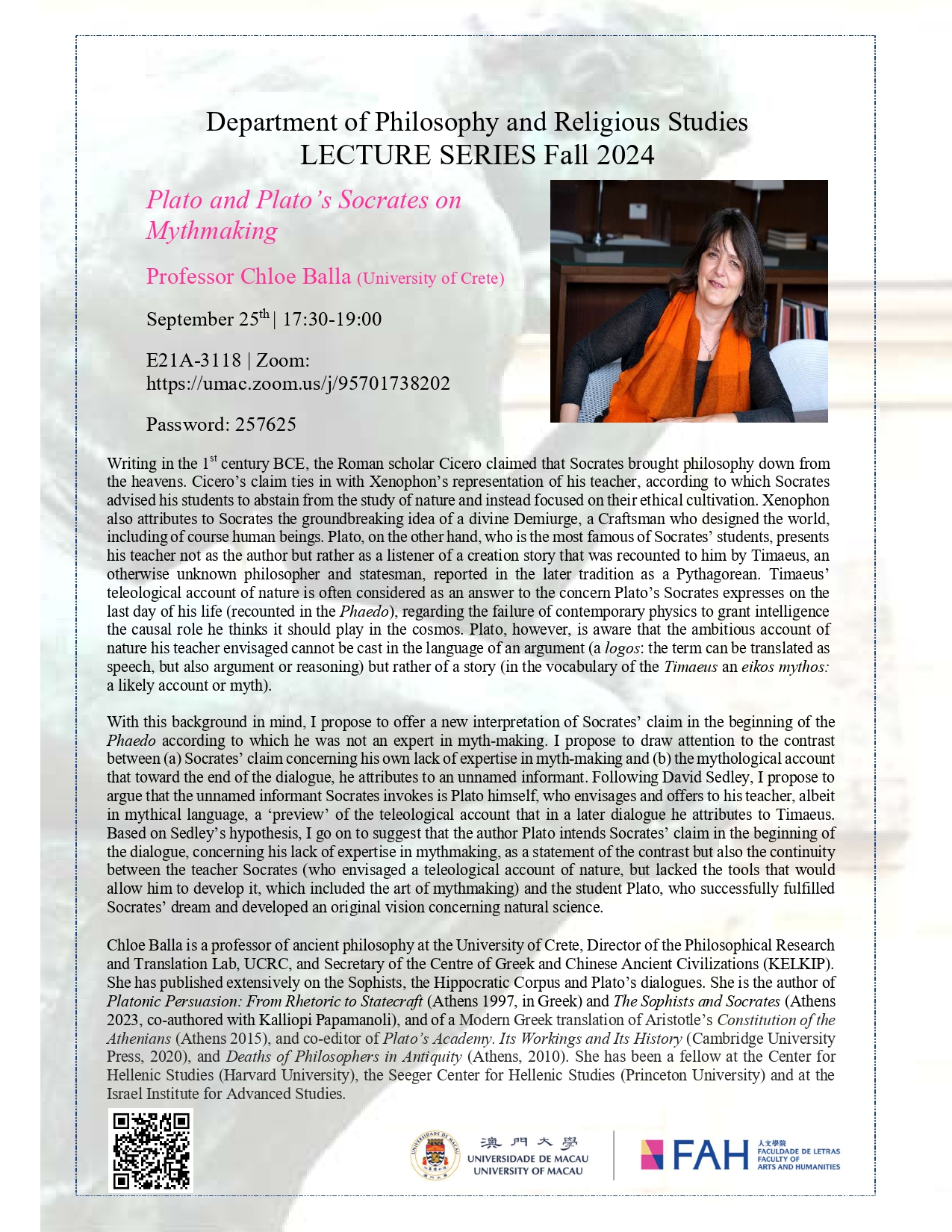

FAH/DPHIL Lecture Series – “Plato and Plato’s Socrates on Mythmaking” by Prof. Chloe Balla, University of Crete, Greece
2024-09-25 @ 5:30 pm ~ 7:00 pm
Zoom: https://umac.zoom.us/j/95701738202
Password: 257625
Abstract
Writing in the 1st century BCE, the Roman scholar Cicero claimed that Socrates brought philosophy down from the heavens. Cicero’s claim ties in with Xenophon’s representation of his teacher, according to which Socrates advised his students to abstain from the study of nature and instead focused on their ethical cultivation. Xenophon also attributes to Socrates the groundbreaking idea of a divine Demiurge, a Craftsman who designed the world, including of course human beings. Plato, on the other hand, who is the most famous of Socrates’ students, presents his teacher not as the author but rather as a listener of a creation story that was recounted to him by Timaeus, an otherwise unknown philosopher and statesman, reported in the later tradition as a Pythagorean. Timaeus’ teleological account of nature is often considered as an answer to the concern Plato’s Socrates expresses on the last day of his life (recounted in the Phaedo), regarding the failure of contemporary physics to grant intelligence the causal role he thinks it should play in the cosmos. Plato, however, is aware that the ambitious account of nature his teacher envisaged cannot be cast in the language of an argument (a logos: the term can be translated as speech, but also argument or reasoning) but rather of a story (in the vocabulary of the Timaeus an eikos mythos: a likely account or myth).
With this background in mind, I propose to offer a new interpretation of Socrates’ claim in the beginning of the Phaedo according to which he was not an expert in myth-making. I propose to draw attention to the contrast between (a) Socrates’ claim concerning his own lack of expertise in myth-making and (b) the mythological account that toward the end of the dialogue, he attributes to an unnamed informant. Following David Sedley, I propose to argue that the unnamed informant Socrates invokes is Plato himself, who envisages and offers to his teacher, albeit in mythical language, a ‘preview’ of the teleological account that in a later dialogue he attributes to Timaeus. Based on Sedley’s hypothesis, I go on to suggest that the author Plato intends Socrates’ claim in the beginning of the dialogue, concerning his lack of expertise in mythmaking, as a statement of the contrast but also the continuity between the teacher Socrates (who envisaged a teleological account of nature, but lacked the tools that would allow him to develop it, which included the art of mythmaking) and the student Plato, who successfully fulfilled Socrates’ dream and developed an original vision concerning natural science.
Bio
Chloe Balla is a professor of ancient philosophy at the University of Crete, Director of the Philosophical Research and Translation Lab, UCRC, and Secretary of the Centre of Greek and Chinese Ancient Civilizations (KELKIP). She has published extensively on the Sophists, the Hippocratic Corpus and Plato’s dialogues. She is the author of Platonic Persuasion: From Rhetoric to Statecraft (Athens 1997, in Greek) and The Sophists and Socrates (Athens 2023, co-authored with Kalliopi Papamanoli), and of a Modern Greek translation of Aristotle’s Constitution of the Athenians (Athens 2015), and co-editor of Plato’s Academy. Its Workings and Its History (Cambridge University Press, 2020), and Deaths of Philosophers in Antiquity (Athens, 2010). She has been a fellow at the Center for Hellenic Studies (Harvard University), the Seeger Center for Hellenic Studies (Princeton University) and at the Israel Institute for Advanced Studies.

